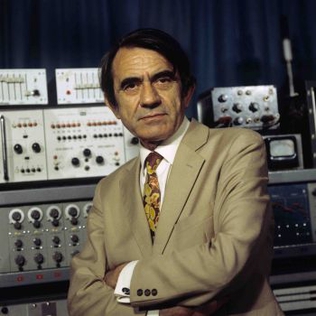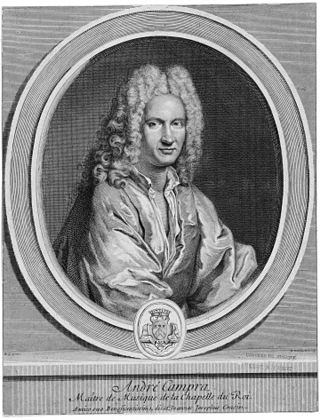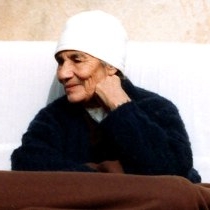
Pierre Henri Marie Schaeffer was a French composer, writer, broadcaster, engineer, musicologist, acoustician and founder of Groupe de Recherche de Musique Concrète (GRMC). His innovative work in both the sciences—particularly communications and acoustics—and the various arts of music, literature and radio presentation after the end of World War II, as well as his anti-nuclear activism and cultural criticism garnered him widespread recognition in his lifetime.

André Campra was a French composer and conductor of the Baroque era. The leading French opera composer in the period between Jean-Baptiste Lully and Jean-Philippe Rameau, Campra wrote several tragédies en musique and opéra-ballets that were extremely well received. He also wrote three books of cantatas as well as religious music, including a requiem.

Marie-Joseph Alexandre Déodat de Séverac was a French composer.

Joseph-François Kremer is a French composer, conductor, cellist and musicologist.

Dariush Safvat also spelled as DaryushSafvat, was a master Persian traditional musician, teacher, and ethnomusicologist. Safvat is best known for his mastery of setar and santur instruments. Safvat was the founding director of the Center for the Preservation and Research of Music in Tehran; and some credit Safvat with saving traditional music from obliteration in the 1970s.

Renaud Garcia-Fons is a French bassist and composer.

Nur Ali Elahi was an Iranian philosopher, judge and musician of Kurdish descent whose work investigated the metaphysical dimension of human beings.

Stéphane de Gérando is a French composer, conductor, multimedia artist, and researcher.

Malak Jân Nemati was born in 1906 in Jeyhounabad, a village in Iranian Kurdistan. Also known as Sheikh Jâni and Saint Jani, she was a charismatic figure and a mystical writer and poet in Kurdish and Persian language. She was the daughter of Hajj Nematollah and the sister of Ostad Elahi. There are few written sources about her life. Some elements can be found in the words of her brother Ostad Elahi whom she was very close to. A biography in French was published on the occasion of the centennial of her birth, including the translation of some of her poems and sayings.

André Almuró was a French radio producer, composer, and film director.
Marc Battier is a French composer and musicologist.

Ahmad Kamyabi Mask is a writer, translator, publisher, and current Professor Emeritus of Modern Drama and Theater of the Faculty of Fine Arts of the University of Tehran. He is a prominent scholar of French Avant-garde theater and influential in the study of Eugène Ionesco and Samuel Beckett.
Max Pinchard was a 20th-century French composer and musicologist.
Makis Solomos is a Franco-Greek musicologist who specializes in contemporary music, particularly the work of Iannis Xenakis. He is also one of the specialists in Adorno's thought. His work focuses on the issue of sound ecology and decay. He has published articles and books and participates in meetings and symposia. In 2005, he participated in the creation of the magazine "Filigranes", which aimed to broaden the field of musicology.

Brigitte François-Sappey is a French musicologist, educator, radio producer, and lecturer.

Éric Humbertclaude is a French musician, organist, contemporary composer, writer and essayist, musicologist, researcher specializing in contemporary music and pipe organ music.
Norbert Stéphane Jean-Marie Dufourcq was a French organist, music educator, musicologist and musicographer.
Jacques Chailley was a French musicologist and composer.
François-René Tranchefort was a contemporary French musicologist.
Michel Hulin is a French philosopher, specialised in Indian philosophy. An alumn of the École normale supérieure, he obtained his doctorate in philosophy from the Paris-Sorbonne University in 1977 with a dissertation on the Vedic concept of ahamkara. He was a professor of Indian and comparative philosophy at Paris-Sorbonne from 1981 to 1998. His research has focused on classical Indian philosophy, such as the nondualism in Vedanta, Tantric-inspired texts in Shaivism and the confrontations between European and Asian traditions of thought.













